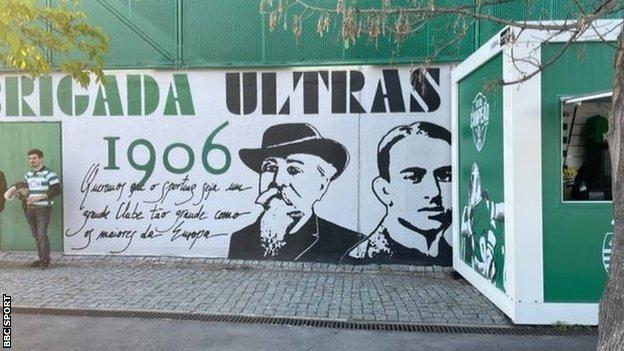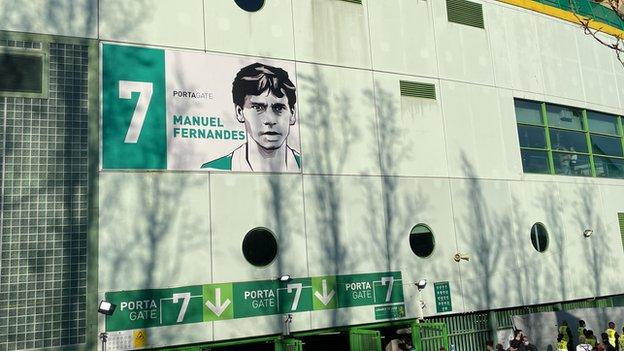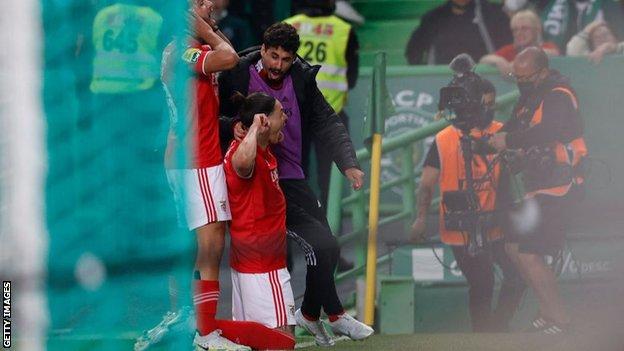| Date: Saturday, 23 April. Time: 12:00 BST. Channel: BBC One and Red Button |
A firecracker came skidding across the concrete towards the camera and went off with a violent boom.
It was a warning not to film the faces of the No Name Boys, the Benfica ultras who were among about 3,000 fans gathering outside the Estadio da Luz four hours before kick-off to chant, drink and meet friends before making the walk to the Jose Alvalade Stadium, home of rivals Sporting.
“You feel like an army going to enemy territory,” says Filipe Ingles, who runs the podcast Benfica FM. “We are going there to represent Benfica on the stands as much as the players represent us on the field and we give everything.”
Less than two miles away, supporters draped in green and white mingle outside the Alvalade, where a ‘Campeao Nacional 2020-21’ banner hangs to mark Sporting’s first league title in 19 years.
It’s less edgy but just as lively and the remains of a Benfica shirt burn beneath a stairwell emblazoned with ‘Juventude Leonina’, the oldest supporter club in Portugal and whose members were held responsible for attacking players at Sporting’s training ground in 2018.
When the wind turns you can hear the opposition fans approaching, marched by police into the away end, but as more ticket holders arrive on the scene the home chants intensify and the flares become more frequent, peaking with a series of fireworks whistling and popping in the evening sky.
This is an atmosphere that blurs the senses, one you can taste as well as see, where the smell of Bifanas – pork loin steak marinated in stock and red pepper paste, served in a crusty bread roll – lingers and vibrant colours disappear behind a hazy filter of smoke and flares.
It is a fitting setting for one of the oldest and most passionate rivalries in Europe.

“It is kind of a spiritual thing,” says Beatriz Marujo, from CNN Portugal. “In Portugal, football is like a religion. Everybody has to stop and live and feel everything – the bad, the good. We are talking about two clubs who are separated by just one street.”
It is a rivalry that dates back more than a century, with the sides who would become officially known as Sporting Clube de Portugal and Sport Lisboa e Benfica first meeting in 1907 at a time when there was a huge class divide between them.
Sporting, bankrolled by the Viscount of Alvalade, had already riled their rivals by taking eight of their players on the promise of better facilities and won 2-1.
Benfica’s image as the people’s club was, meanwhile, encapsulated in 1954 by their fans helping to build the original Estadio da Luz, a stadium that boasted its record attendance of 135,000 people for a game against Porto in 1987 and was their home until the new ground was built before Euro 2004.
Then there was Eusebio, who played for Sporting’s feeder club Sporting Clube de Lourenço Marques in Mozambique but ended up signing for Benfica and helping them to 11 league titles and a European Cup in 15 seasons, while also winning the Ballon d’Or.
“Eusebio had everything lined up to come to Sporting,” explains Expresso journalist Diogo Pombo.
“He got on a plane but when he landed in Lisbon, people who were working for Benfica went there, snatched him and hid Eusebio in a hotel – he is the biggest player Benfica has ever had and the most important in their history.”
Eagles fan Ingles calls it “the biggest ‘what if?’ in Portuguese football”, although Eusebio said the real story was that his mother signed the contracts because Benfica offered him a professional deal and Sporting just the chance to trial with their reserves.
‘A derby that moves the entire country’
Manuel Fernandes has lived the derby as a fan, player and coach. He is Sporting’s second all-time top goalscorer and is the man credited with bringing Sir Bobby Robson to the club in 1992, along with Jose Mourinho, who he insists was a member of the coaching team rather than merely a translator.
However, it is for his goalscoring exploits rather than his time in the dugout that Fernandes, who captained the club for eight seasons, has gone down in Lisbon derby folklore – netting four during a 7-1 win over Benfica in 1986.
“This is the only match that touches Portugal, the only derby in the championship that moves the entire country,” explains the 70-year-old.
That is because the majority of football fans in Portugal support one of Benfica, Sporting or Porto – it is thought Benfica alone have around six million followers in a country with a population of just over 10 million people.
Fernandes, capped 31 times for his country, feels the atmosphere around the derby has changed since his playing days.
“I played for the national team many years with Benfica captain Humberto Coelho,” he adds. “When Benfica was champion after a match I went to drink a glass of champagne in their changing room and this is healthy.
“But the rivalry will always exist and today things like this are impossible – the commentators and the TV are different from the past and this creates a little of a hostile environment.”

Expresso journalist Pombo agrees: “I wouldn’t say violent but it is edgy, definitely. In the last 10 or 15 years things got a bit fired up, too much fired up. Sporting had a president, Bruno de Carvalho, and while he was there the fire really started burning a lot more.
“Both presidents didn’t really have that good of a relationship and gave a lot of interviews on TV and in the media – things weren’t really that peaceful between the fans, because they always got that energy, but nowadays it is calmer.”
The hatred between some fans has previously resulted in tragedy. In 1996, during the Portuguese Cup final, a firecracker thrown from the Benfica ultras killed a Sporting fan, while in 2017 a Sporting fan died after being hit by a car during a night of trouble.
But for the majority of supporters the rivalry is fuelled by a passion for their club rather than violence.
“It is the closest thing I have to a religion,” says Ingles. “Benfica has given me so many friends and journeys and experiences, it is like a member of my family. I don’t know with whom I’ll be, where I will be, but I know I will be a Benfica fan for all my life.”
“It grows with you and the passion grows with you,” adds Sporting fan Andre Barroca Sobral. “It is something you cannot really describe, but the word that always comes to mind is honour – Sporting always has the history and the honour of having the most passionate supporters.”
A gateway to Europe’s biggest leagues

Inside the Alvalade, Sporting fans are going through their pre-match rituals. They hold up placards bearing their badge, belt out the club’s anthem and then deliver a stirring rendition of Frank Sinatra’s My Way as the game kicks off.
The hosts dominate possession but it is Benfica who take the lead through Darwin Nunez, who is likely to follow a similar path to many talented youngsters who pass through Lisbon and use the Primeira Liga as a stepping stone to bigger things.
Portugal has become a gateway to Europe for some of South America’s brightest talents and 22-year-old Uruguay forward Nunez, who arrived via a season in the Spanish second tier with Almeria, is already being linked with several Premier League clubs.
“One of the most amazing things Benfica has done is find players like Angel di Maria, Ramires, Nemanja Matic, Joao Felix, Bernardo Silva, Ruben Dias. I could go on and on,” says Ingles.
“Unfortunately as a fan we get only one good season out of them as they go to England or Spain and then it is very wonderful to see them having great careers, but I wish they stayed at Benfica and won more titles.”
Nunez adds to his value by setting up Benfica’s second in stoppage time to seal a 2-0 victory, sending the away fans in the corner wild as disgruntled home supporters begin to trickle out.
The result will count for little beyond bragging rights this season – Sporting should still finish second, taking an automatic Champions League spot, and Benfica third as Porto run away with the title.
In fact, only twice since 1938 have a club outside of the big three won the league – Boavista in 2000-01 and Belenenses, Lisbon’s third team who reside in the fourth tier after the club split in two four years ago, in 1945-46.
So while there might not be a league title heading to the Portuguese capital this year, if you cut Lisbon in half as the dust settles on the derby it will be a city that bleeds red and green.






